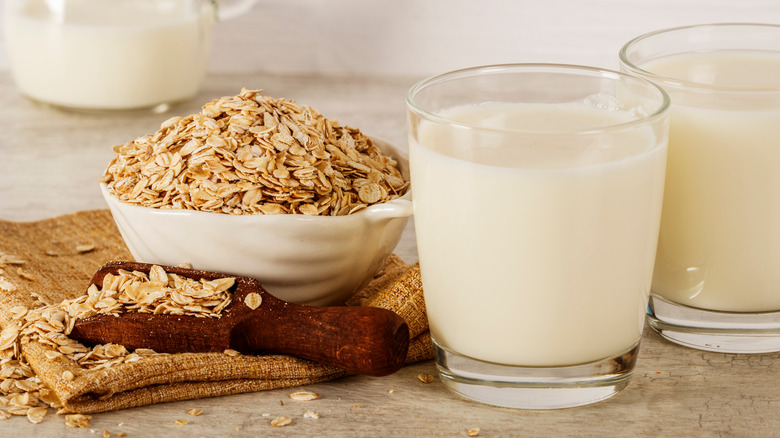Here's How Much Sugar Is Really In Your Glass Of Oat Milk
Oat milk is made from rolled or steel-cut oats that have been soaked in water, blended, and then strained to remove the solids. According to Globe Newswire, this plant-based milk had a worldwide market valuation of $1.5 billion in 2021 and is becoming increasingly popular. Its creamy and slightly sweet taste makes it a great substitute for dairy milk in recipes or beverages. One of the reasons oat milk is so popular is its environmental sustainability. According to Science News, oats require less water and land to produce than is needed to care for cows, making it a more sustainable option than traditional dairy milk. Additionally, oat milk has a lower carbon footprint than cow's milk, reducing its environmental impact.
Another reason for oat milk's popularity is its suitability for people with dietary restrictions. Oat milk is lactose-free and suitable for people with dairy allergies or lactose intolerance. It is also a vegan option for people who follow a plant-based diet. Additionally, it is gluten-free, making it a good option for people with celiac disease or gluten sensitivity.
Overall, oat milk is a versatile ingredient that is easy to find in your local supermarket, or to make at home with simple ingredients and equipment. However, while it can be a nutritious and delicious alternative to dairy milk, it is important to be mindful of the amount of sugar it contains.
Oak milk can contain both natural and added sugars
When shopping for oat milk, it is important to check the nutrition label and ingredients list to determine how much sugar is in the product. The nutrition label will list the total amount of sugar per serving, which includes both natural sugars from the oats and any added sugars. The ingredients list will also note any sweeteners that have been added to the product.
According to Medical News Today, oat milk's sugar content is about 7.01 grams per cup. Like other types of milk, oat milk can contain added sugars; however, the amount of sugar will differ depending on the brand and type (i.e., if it's a flavored variety). Some brands may add sweeteners to enhance the flavor of their product. Others may use naturally sweetened ingredients like dates or vanilla extract.
To reduce your sugar intake when drinking oat milk, Healthline advises opting for unsweetened oat milk, which contains no added sugars and typically has lower overall sugar content. Another option is to make your own oat milk at home using whole oats and water, allowing you to control the sugar in the final product. Generally speaking, by reading nutrition labels and ingredient lists, you can enjoy the benefits of oat milk while minimizing your sugar intake.
The nutritional benefits of oat milk
While oat milk is often chosen for its taste and versatility, it also offers a range of nutritional benefits. One of the primary benefits of oat milk is its low fat content. Compared to whole dairy milk, oat milk contains less fat per cup, says Medical News Today. This makes it a good option for people who are watching their weight or trying to maintain a healthy diet.
In addition to being low in fat, oat milk is also high in dietary fiber. Fiber is an essential nutrient that helps regulate digestion and improve heart health, explains the Mayo Clinic. A cup of oat milk contains around 1.92 grams of fiber, depending on the brand.
Many brands of oat milk are also fortified with vitamins and minerals, such as calcium and vitamin D. According to Johns Hopkins Medicine, adequate intake of calcium is important for building and maintaining strong bones and teeth throughout life. Vitamin D helps the body absorb calcium and is essential for healthy muscles and nerves. A deficiency in calcium and vitamin D can lead to weak bones and osteoporosis. Another important vitamin found in oat milk is B12. This is a water-soluble vitamin that plays a critical role in the production of red blood cells. It is necessary to synthesize DNA, which is essential for the growth and division of cells, explains Harvard T.H. Chan School of Public Health. Oats, in general, also contain magnesium, zinc, and folate and are rich in antioxidants, which can help reduce inflammation and protect against heart disease.



